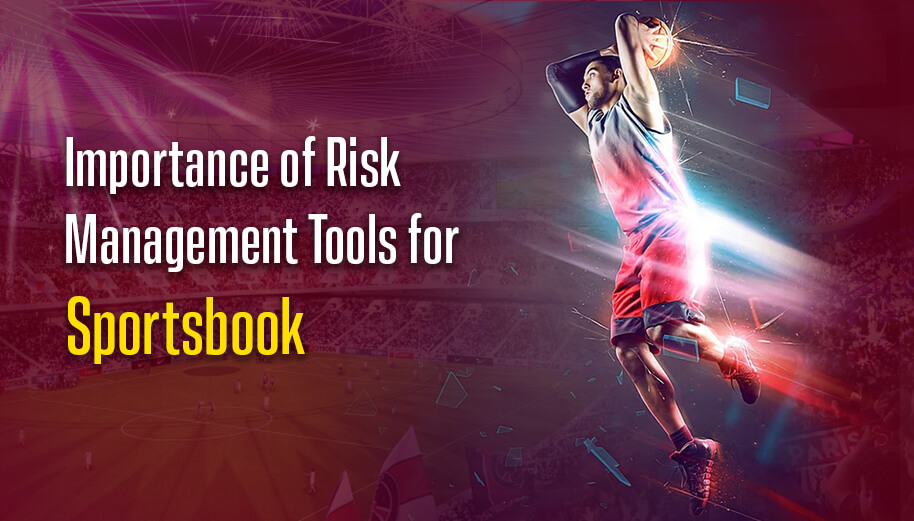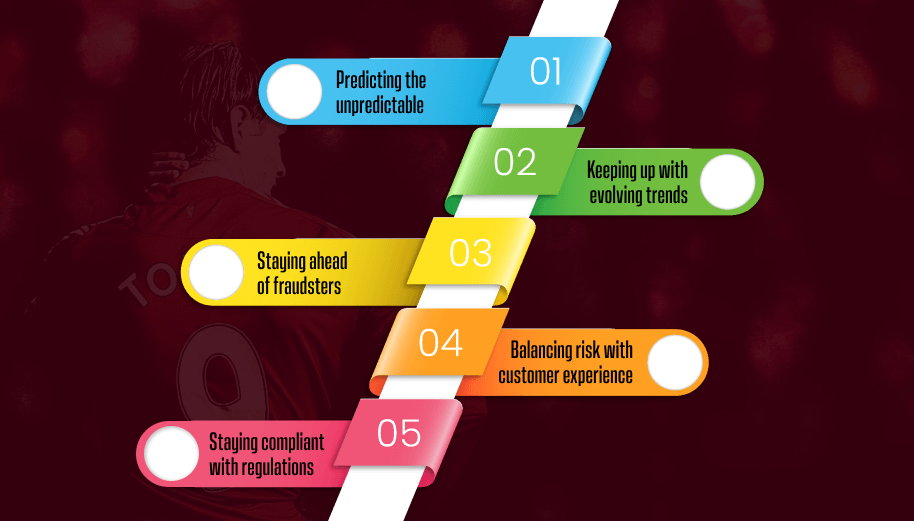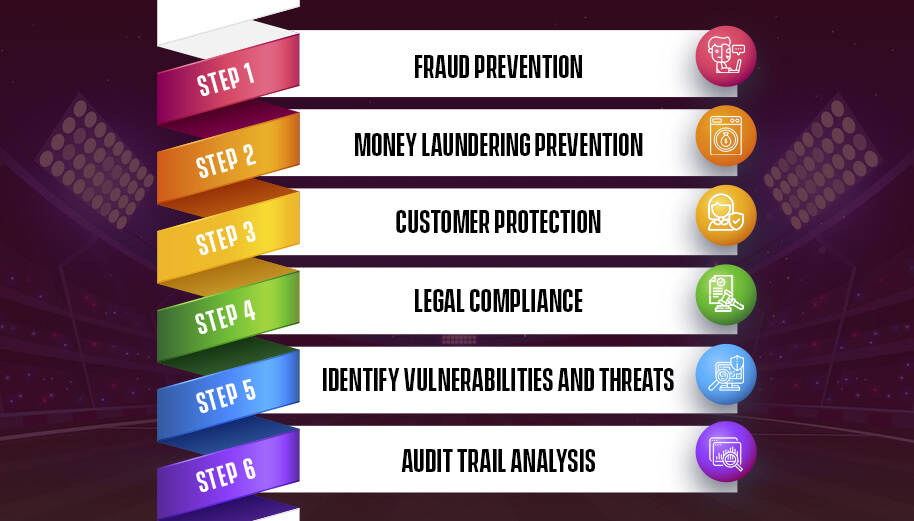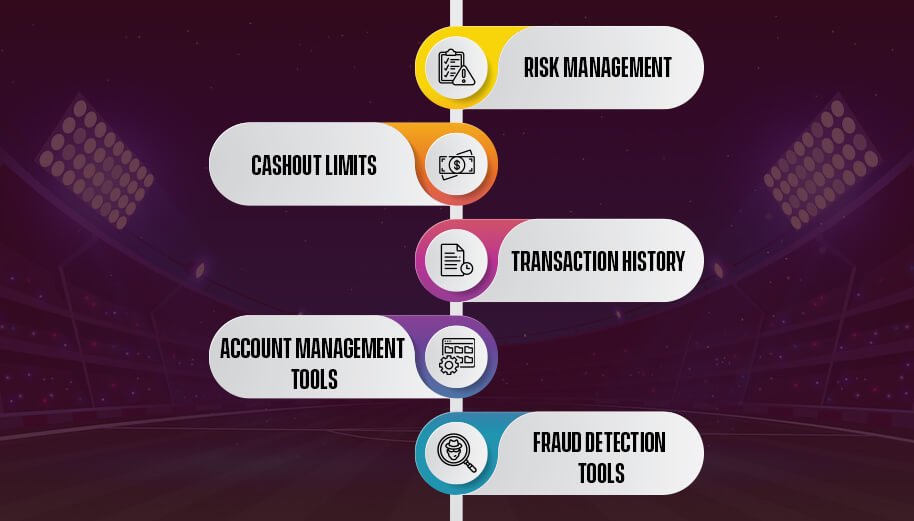TABLE OF CONTENTS
- 1.What Is Sportsbook Risk Management and Why Does It Matter?
- 2.What are the Key Challenges in Sportsbook Risk Management?
- 3.What Are Risk Management Tools?
- 4.How Do Sportsbook Risk Management Tools Work?
- 5.Types of Risk Management Tools
- 6.The Most Essential Risk Management Tools for iGaming Operators in 2025
- 7.How to Choose the Right Risk Management Tools for Your Sportsbook
- 8.Sportsbook Risk Management Tools Provided by iGamingBook
- 9.FAQs

Risk management is one of the most important aspects of any business. It allows you to minimize the impact of risks on
your company, and even turn it into an advantage if you manage to avert them.
When it comes to a sports betting platform, betting risk management plays a crucial role in ensuring profitability, as
well as protecting your gaming licence. Every casino operator should know how to manage risks in order to avoid any
legal or financial troubles.
If you want to succeed in this field, you need to understand how important sportsbook risk management tools are for your
business. They will help you avoid mistakes that can cost your business money or even put its reputation at stake.
Risk management tools will help you identify potential problems before they happen so that you can address them before
they become an issue.
What Is Sportsbook Risk Management and Why Does It Matter?
Sportsbook risk management is all about how a sports betting company handles the ups and downs of the betting business.
It’s like having a plan to deal with unexpected things.
Think of it this way: if a lot of people bet on one team in a game, the sportsbook could lose a lot of money if that
team wins. Risk management helps the sportsbook figure out how to avoid big losses like that.
It involves things like:
- Setting betting limits: This prevents individual bettors from placing wagers that could severely impact
the
sportsbook’s bottom line. - Dynamic odds adjustment: By constantly monitoring betting activity and adjusting odds accordingly, the
sportsbook can mitigate risk and ensure a balanced book. - Hedging strategies: This involves placing offsetting bets with other sportsbooks or exchanges to reduce
exposure
to potential losses. - Advanced analytics and predictive modeling: Utilizing data and sophisticated algorithms to identify and
predict
potential risk scenarios.
So, why is effective risk management in sports betting crucial?
- Profitability: By minimizing unexpected losses, sportsbooks can maintain healthy profit margins.
- Business sustainability: It ensures the long-term viability of the business by preventing catastrophic
financial
events. - Customer satisfaction: Fair odds and responsible betting limits contribute to a positive customer
experience. - Regulatory compliance: Many jurisdictions have regulations related to casino risk management, and
adhering to
these is essential for operating legally.
Thus, robust risk management is not just about avoiding losses. It’s about ensuring the long-term success and stability
of the sports betting business.
What are the Key Challenges in Sportsbook Risk Management?

- Predicting the unpredictable: Sports are inherently unpredictable. Even with advanced analytics, it’s impossible to perfectly foresee every outcome, leaving room for unexpected losses.
- Keeping up with evolving trends: Betting trends are constantly shifting, influenced by factors like player performance, team news, and even social media buzz.
- Staying ahead of fraudsters: Sophisticated fraudsters are always looking for ways to exploit vulnerabilities in sports betting systems.
- Balancing risk with customer experience: Strict risk management measures can sometimes negatively impact the customer experience. Finding the right balance between security and user-friendliness is key.
- Staying compliant with regulations: The regulatory landscape for sports betting is constantly evolving, requiring ongoing adjustments to betting risk management strategies.
These challenges underscore the need for continuous innovation and adaptation in sportsbook risk management. Thus, the importance of risk management in sports cannot be underestimated.
What Are Risk Management Tools?

Risk assessment tools help identify possible threats and prioritize them based on their likelihood of occurring and their impact if they do occur. These tools include checklists, questionnaires, surveys and other techniques designed to gather information about an organization’s assets, vulnerability and exposure to various risks. A risk assessment tool can help identify areas where additional successful sports betting risk management controls are needed or where existing controls aren’t working properly.
How Do Sportsbook Risk Management Tools Work?
There are three main steps of risk management in sports betting:
Identify the Risks
The first step in risk management is to identify the risks that could affect your business. This can be done through brainstorming or by using a checklist.
Assess the Risks
Once you have identified all the possible risks, you need to assess each one individually to determine its impact on your sports betting solution. You can use various techniques for this purpose such as cost-benefit analysis or qualitative analysis.
Prioritize Risks
After making an assessment of each risk, you need to prioritize them based on their impact on different areas of your business such as financials, operations, human resources etc.
Types of Risk Management Tools

Insurance
Insurance is a form of risk management that involves the transfer of risk from one party to another, usually through a financial transaction. Insurance can help to mitigate the financial impact of risks such as personal injury, property damage and loss of life. Insurance companies are a primary source of finance for many types of risk-taking activities especially in the event of uninsured losses. They may also be called upon by governments to bail out institutions when a financial crisis threatens the stability of the entire system, as was the case with the 2008-2009 global financial crisis.

Self-insurance
Self-insurance is an essential component of casino risk management. It includes insurance against loss of business income due to insured property damage or destruction, liability claims and professional liability insurance, as well as coverage for medical payments and legal expenses. Self-insurance is a form of risk transfer where the sports betting platform receives a premium in exchange for assuming risk.
Self-insurance can be used as a primary source of risk financing if the organization has sufficient financial strength to support self-insured claims liabilities. If not, self-insurance should be used as a complement to commercial insurance policies.

Derivatives
Derivatives are financial instruments whose value is dependent on the price of another financial product. They can be used to hedge risk or speculate on changes in the underlying asset's value as a part of risk management in sports betting.
- Forwards and futures contracts
These are agreements to buy or sell an underlying asset at a predetermined price on a specified date. They are used to lock-in prices and avoid future price fluctuations.
- Options
These give one party the right, but not the obligation, to buy or sell an asset at a fixed price at some time in the future. Options provide protection against unfavorable price movements by allowing investors to limit their losses.

Hedging
A hedge is a risk management tool that helps protect against unexpected price changes in the market. Hedging can be used to reduce the risk of losses on assets, liabilities or revenues. For example, a company might buy put options to protect its stock price against a drop in the market. Put options give you the right to sell an asset at a predetermined price in the future. If the asset's price drops below that predetermined level, you can exercise your option and sell it at the predetermined price, thus limiting your potential losses.
The Most Essential Risk Management Tools for iGaming Operators in 2025
Risk management tools are essential for the betting industry. They help you identify, assess and manage risks.
Casino risk management tools help you identify and assess risks in your iGaming platform, as well as in your internal operations.
Here are six ways that successful sports betting risk management tools can help your iGaming platform:


Fraud prevention
Fraud is one of the biggest risks for any iGaming platform, so it’s important to use fraud prevention tools as much as possible. This will help you identify potential fraudsters before they have a chance to do any damage. Fraud detection tools can also be used to find out if someone has been playing on multiple accounts at once or if they’re using multiple devices at once in order to cheat other players out of their money.

Money laundering prevention
Money laundering process can be difficult for authorities to detect when it occurs within sportsbook platforms because
these platforms use multiple methods to mask transactions. One method includes moving funds through various accounts
around the world before depositing them into bank accounts owned by shell companies.
By using risk management tools like KYC software, operators can analyze customer data such as IP addresses, physical
addresses and bank account numbers to determine whether or not customers are using multiple accounts or making
suspicious deposits into bank accounts owned by shell companies.
AML (Anti-Money Laundering) is a critical risk management tool for sportsbook software because it helps prevent criminal
activity. By verifying player identities and monitoring transactions for suspicious patterns, AML features help detect
and stop money laundering, which can be used to fund illegal activities. This protects the integrity of the sports
betting industry, safeguards the company's reputation, and ensures compliance with legal regulations.

Customer protection
It is important to keep customers safe and secure while they are using your iGaming platform. This can be done through risk management tools. Risk management tools are used to control the risks that are associated with online gambling. These risks include protecting players from fraud and theft, keeping players' personal information safe and secure, as well as protecting them from other forms of abuse. Customer protection is an essential part of any iGaming platform. Customers are the lifeblood of any business, so it is important to do everything possible to protect them from harm or exploitation.

Legal compliance
Risk management tools are designed to help you comply with the legal framework in your jurisdiction. For example, if you’re licensed by an online gambling regulator, you have to follow its regulations and policies. Many jurisdictions require that you keep records of all transactions and interactions with players and provide these records to regulatory bodies upon request. Some regulators also require that you use certain software to store these records. If your platform is not fully compliant with the regulations in your jurisdiction, it could lead to penalties or even closure. This could be devastating for your business and reputation. In addition, if you don’t maintain proper records during an investigation by a regulator, it could make things worse for you.

Identify vulnerabilities and threats
Before you launch your online gaming site, it's important to conduct a vulnerability assessment to identify all of the potential vulnerabilities in your system. This includes everything from cyberattacks to physical attacks on employees and data centers. The more thorough this assessment is, the better equipped you'll be when it comes time for an emergency response plan or disaster recovery strategy.

Audit trail analysis
The benefits of audit trail analysis are many. It can help your iGaming platform to identify and track fraudulent activity, it can be used to reduce the instances of chargebacks, and it can also be used to track down money laundering activities. Audit trail analysis is a powerful tool that helps you save time, money and effort. You don’t have to spend hours or days trying to figure out who did what and when. With this technology, you can see exactly what happened in just seconds! The benefits of audit trail analysis include:
- Identifying Fraudulent Activity
Audit trails allow you to see exactly where the problem is coming from so you can take action immediately. This helps you prevent future instances of fraud from occurring again by taking appropriate steps such as blocking access from that user or IP address or even freezing their account altogether until they can be properly investigated by a human being.
- Reducing Chargebacks
Audit trails will show you which transactions were fraudulent so that you can prevent them from happening again in the future. This will help reduce the number of chargebacks your company receives which will lower overhead costs associated with refunds and other expenses related to customer service complaints regarding fraudulent activity on your site.
How to Choose the Right Risk Management Tools for Your Sportsbook
Selecting the appropriate risk management tools is crucial for the success of your sportsbook. Consider the following factors:


Comprehensive Risk Assessment
The focus of effective risk management should be to analyze betting patterns, players' behavior, and market trends in search of risks and opportunities. It thus enables the operator to make informed decisions and adopt practical strategies that avoid exposure to loss. This means that operators need to look for risk assessment and management tool bundles for overall security.

Real-Time Monitoring
It's important that bets and transactions are traceable in real time for the swift location of irregular activities. In this way, suspicious behavior can be responded to immediately to avoid any potential fraud and keep the sportsbook honest. Thus, the risk management tools should be efficient in view of these tasks.

Automated Alerts
The auto-alert mechanism in the risk management system should be included to alert the operators in case of any suspicious betting patterns or any security threat. These alerts help solve problems quickly and keep the platform reliable.

Customizable Betting Limits
Tools that empower individuals to control how much they can bet based on active factors such as who's playing, what's happening, or how the markets go will help protect some of the money for the players. Betting limits ensure players do not overdo gambling and play responsibly. Also, with a zero risk betting strategy, players enjoy every bit of sports betting without any risk.

Integration Capabilities
Make sure the risk management tools work in harmony with your sportsbook and other services. This is absolutely crucial for streamlined operations and data flow across systems. Incompetence would result in failure of risk assessment and mitigation.

Regulatory Compliance
Prefer working tools that correspond to legal standards and regulations in a specific country where the activity is enabled. This will make the given sport book a real deal; no troubles will come forth, so people can easily trust it.

User-Friendly Interface
A very usable and understandable risk management system means it will be well-used by your team, which learns easily and has fewer chances to commit mistakes. Such usability plays a great role in the efficiency of processes related to risk management.
Sportsbook Risk Management Tools Provided by iGamingBook
iGamingBook is a sports betting solution provider that offers a fully featured sports betting software solution that comes with a set of tools to support your business.
Below is an overview of the key risk management tools provided by iGamingBook’s white label sportsbook:

Risk Management
Our software lets you set a maximum loss for each individual bettor, or for the site as a whole. This allows you to protect yourself from excessive losses and prevent players from betting more than they can afford to lose.
Cashout Limits
We provide cashout limits to ensure that players do not withdraw too much money from their accounts at once and put you at risk of having to pay out more than you have on hand. These limits can be customized based on the preferences of each operator.
Transaction History
Our transaction history feature allows operators to view all transactions made by their players, whether they are deposits or withdrawals, so they can easily see who has made what transactions and when they occurred. This will help protect against fraud and cheating by players trying to hide their activity from the site administrator so they do not have to pay their winnings back or pay any fees associated with those winnings.
Account Management Tools
iGamingBook's white label sportsbook allows you to easily manage your customers' accounts through the use of flexible password rules, IP address filtering, and two-factor authentication (2FA). These account management tools make it easy for you to ensure that only authorized users can access their accounts while preventing unauthorized access from hackers or other malicious actors.
Fraud Detection Tools
iGamingBook's white label sportsbook provides real-time alerts that inform you when there are suspicious activities occurring on your site. These fraud detection tools allow you to quickly detect fraudulent activity on your site so that you can take action before it becomes too costly or damaging to your business.
Frequently Asked Questions
What is risk management in gambling?
Risk management in gambling is the process of minimizing the amount of risk that a player takes in order to maximize his or her chances of winning.
What is the purpose of a risk management tool?
The purpose of a risk management tool is to help you identify risks and make plans to prevent or mitigate them.
Why is risk management an important aspect of a sportsbook platform?
A sportsbook platform's risk management policies are designed to minimize the amount of money lost due to unforeseen circumstances, such as fraud or technical issues.
Which is the most commonly used risk management tool?
The most commonly used risk management tool is a comprehensive risk assessment. This process involves examining the risks your company faces and determining which ones are most likely to occur, how they might affect your business, and how to mitigate them with appropriate plans of action.
Which tool is used to measure risk?
The tool used to measure risk is the risk assessment matrix. It's a grid that measures different factors of a project and their relation to each other.
Sources:
- https://www.invensislearning.com/blog/risk-management-tools-techniques-in-pm/
- https://en.wikipedia.org/wiki/Risk_management_tools
- https://oddsmatrix.com/risk-management-in-sports-betting/
- https://upgaming.com/sportsbook-risk-management-what-you-need-to-know/#:~:text=It%20involves%20implementing%20strategies%20and,potential%20financial%20risks%20and%20losses.



